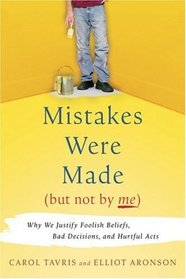Helpful Score: 2
If you've ever wondered why people can do obviously unethical things and maintain that they are not guilty of anything this book will answer the questions. It will also shine a light on your own times of blindness to your faults and transgressions. Not for the reader who wants to maintain their illusion of blamelessness. If you want to become more aware of how you fool yourself into excusing your bad behavior and become a better person this book points out how to recognize your motivations and actions.
Helpful Score: 1
Mistakes Were Made (but not by me) will appeal to anyone who has ever marveled at another person's poor judgement. The authors are psychologists who have done a lot of research into the subjects of cognitive dissonance and self-justification, and reference a number of studies to support their claims. They write in a way that is engaging and not the least bit dry.
A glance at the table of contents shows that the book covers a broad spectrum of types of mistakes and people who make them, from the political (Dubya versus JFK) to the personal (why people stay in bad marriages, and why those who leave claim to never have loved their spouses in the first place). I found myself skimming some of the chapters that did not interest me as much, but that is not surprising considering the large number of topics the authors devote their attention to.
The only thing I don't like about it is that some of the examples of self-justification they give are things I have done so I feel guilty after reading it! Unfortunately the people who most need to read a book like this certainly won't read it, but at least those of us who do will have a better understanding of how to recognize and avoid falling into the pitfalls of self-deception.
A glance at the table of contents shows that the book covers a broad spectrum of types of mistakes and people who make them, from the political (Dubya versus JFK) to the personal (why people stay in bad marriages, and why those who leave claim to never have loved their spouses in the first place). I found myself skimming some of the chapters that did not interest me as much, but that is not surprising considering the large number of topics the authors devote their attention to.
The only thing I don't like about it is that some of the examples of self-justification they give are things I have done so I feel guilty after reading it! Unfortunately the people who most need to read a book like this certainly won't read it, but at least those of us who do will have a better understanding of how to recognize and avoid falling into the pitfalls of self-deception.




